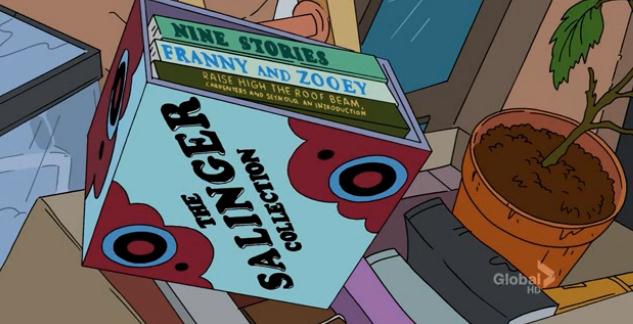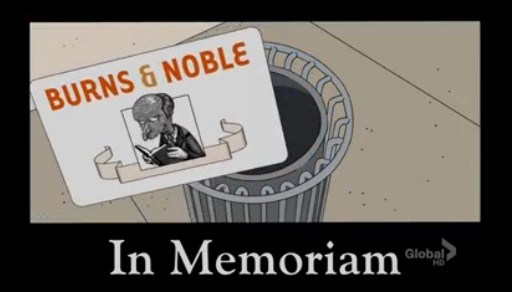(part of my ongoing Unexpected Literary References series) It's no secret that Catcher in the Rye is J.D Salinger's most famous work. So, I suppose The Simpsons doesn't so much insult Salinger as it does simply remind people that Salinger was important at one time, for one book. In this, Season 22 Episode 16 episode called "A Midsummer’s Nice Dream" (the title itself a literary reference) Marge discovers "A box set of all of J.D Salinger's novels except Catcher in the Rye" among a pile of garbage that once belonged to the town hoarder, implying that only a crazy hoarder would actually keep copies of these "other" books.
Tag Archives the simpsons
No matter the reality, books feel to most of us like the last bastion of commercially untouched culture available to us. We see product placements in every TV show and movie, and ads occupying every inch of livable off-screen space, but books seem to be pretty much ignored by advertisers. Why is this? I’ve been hired by Caleb J. Ross Enterprises to explore this question. Oh, and for all of your enterprising needs, call on Caleb J. Ross Enterprises: “Enterprising Since Even Before Star Trek.” Mentioned in the video: Unexpected Literary References blog category: https://calebjross.com/category/lit-references/
I love cartoons. I love books. I love when these two vices come together. Since June 2010, when I noticed a Shirley Jackson nod in an episode of South Park, I’ve become sensitive to other literary references in pop-culture, specifically cartoons. These past few months have been strong for my Unexpected Literary References series. South Park, American Dad, Looney Tunes, Conan O'Brien, and The Simpsons all delivered. But what makes this blog post worthy is a comment on a recent-ish blog post (about Neil Gaiman’s appearance on The Simpsons): “why are they ‘unexpected’? Especially in the programs you tend to feature (especially in the Looney Toons!–not to mention Hannah and Barbara stuff, not that you’ve mention that, yet) it is actually quite expected and part of the draw of the programs.” What do you think? Am I jaded? Are references to literature in pop culture more common than I give…
(part of my ongoing Unexpected Literary References series) Though the wonderful Pablo D'Stair recently called me out on the possible inaccuracy of calling this series "unexpected" literary references, I'm too far in to change the name (re: too lazy to change the name). And this latest find, from last week's episode of The Simpsons, does not help defend any point I may have had about the unexpectedness of lit references in cartoons. Perhaps the series should be called "Great Unexpected Literary References For Those Who Don't Watch Much TV But Also Don't Read Much So Therefore Probably Only Bake Cookies And Make Crafts With Hot Glue Guns." In this episode (S23E7 – "The Man in the Blue Flannel Pants") Bart learns that he actually enjoys reading, and in doing so must hide his new love from Nelson and the rest of the bullies. Why is this reference blog worthy? First, I'm…
(part of my ongoing Unexpected Literary References series) Yesterday (11-20-2011) The Simpsons continued its legacy of literary references with an episode featuring Neil Gaiman, author of American Gods, Anansi Boys, and many others . The episode, "The Book Job" (season 23, episode 6), explores the culture of tween lit, specifically stories featuring vampires and magicians, using an Ocean's Eleven-style heist as the plot backdrop. Though the episode speaks primarily to the idea that tween lit may be hugely factory produced for market consumption rather than intellectual stimulation, the optimistic take-away is that even in a world where television and the internet dominate as means of entertainment and information distribution, books seem to be making a resurgence. This, my hope anyway, will seed these tween literateurs with a life-long love of reading. About "The Book Job": Lisa becomes disheartened when she learns the shocking truth behind the "tween lit" industry and her beloved fantasy novel…



